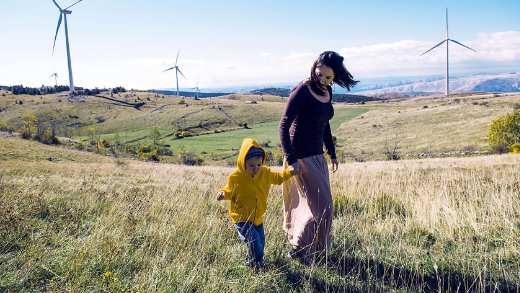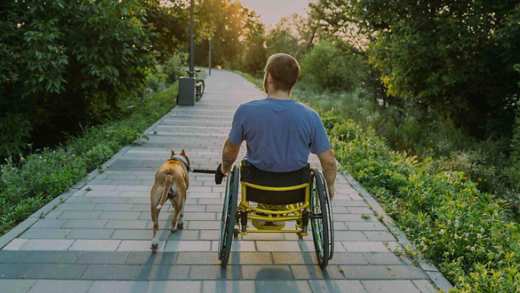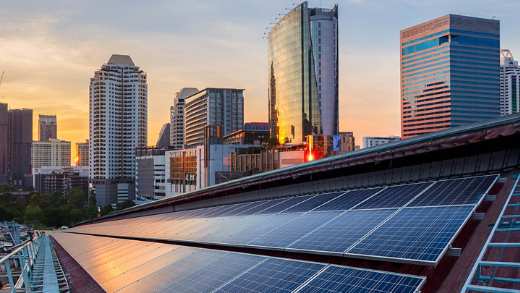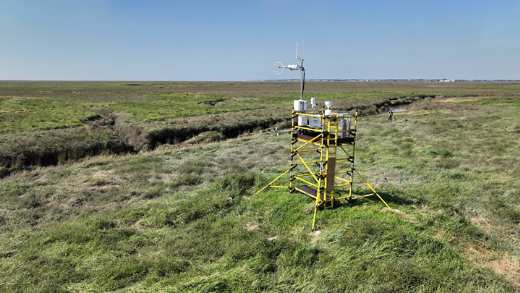Climate change is occurring at an increasingly evident pace.
So, what’s the pace of climate action from eight of the world’s most advanced economies?
The Climate-Ready Index
Transcript for video Watch our Group CEO, Amanda Blanc, discuss the latest Climate-Ready Index
David Schofield
So Amanda, it's great to be with you for the launch of our second Climate-Ready Index.
Amanda Blanc
I know. I actually can't believe that it's a year since we sat down last, David, and talked about this.
And it's really important, isn't it, this Climate-Ready Index? Looking at how the world's largest economies - including the UK, Ireland and Canada - are doing in their tackling of climate change.
Not just in the mitigation, but also the adaptation to the consequences we obviously find ourselves in.
David Schofield
And why do you think it's so important?
Amanda Blanc
Well, it's very important for Aviva. Aviva has always felt that it has a real role to play in raising the voice around tackling climate change. Of course, it’s very important for us as a business. But we also believe that it's important that we involve the country plans in that, and look at how the various countries, particularly those in which we are operating, are doing in preparing for climate readiness.
So, I think we have a very, very important role and a very important voice to play there.
And of course we have said that we want the UK to be the most climate-ready large economy by 2030.
OK, so David, tell me, what does this year's report actually say?
David Schofield
Well, to be honest, Amanda, if you pardon the pun, it tells us we're treading water. We're just not going far enough and we're not going fast enough. And that means we're still feeling the effects of climate risks, whether that's as businesses or in our families.
And actually, we're missing the opportunities of transitioning to a green and inclusive economy.
It's interesting to see what the US has done. Now, we haven't seen them move in the index yet, but their inflation reduction plan is really incentivising the kind of investment and innovation to get climate-ready.
That's going to be interesting to see how it plays out.
This year, the UK stays in third position behind Germany and France. I have to say though, we dropped ten points on our mitigation score and that is before the recent rowbacks in policy which could jeopardise our net zero targets. And they just don't provide the clarity and confidence that business needs to really get behind climate-ready initiatives. And for me that's a real shame because there is some good news in there.
I know you’ve personally been very involved with climate transition plans. Last year, 34% of businesses in the UK had a climate plan. This year, 44% of businesses have a climate plan.
That's fantastic momentum and I'm not surprised because, despite cost of living challenges, still seven out of ten consumers think it's really important that we act now on climate readiness.
So there is a huge opportunity there for us.
The UK has to do better at phasing out fossil fuel extraction. We have to do better at things like energy efficiency, which is part and parcel of the whole cost of living challenge.
And we can be... maybe we are... but we certainly could cement our position as a leader in renewable energy, and I know that's something Aviva is investing behind.
Now, of course, the index looks at the G7 and Ireland. Ireland continue to make progress. They've got a legally binding carbon budget now and Canada have jumped two places because of their national adaptation strategy.
It just goes to show with dedicated, focused action you can turn the dial, but we're just not going far enough, fast enough to get climate-ready.
Amanda Blanc
Thanks for that, David.
So clearly there is some good news there for UK, Ireland and Canada in different parts, and obviously Aviva recognises that it has its role to play, but clearly what we want to see is government playing its role.
And clearly there is this debate around the cost of living challenge and should we have to choose climate over cost of living? And I don't really see it like that.
I do actually think that actually getting green infrastructure right, getting all of the energy security right can actually help with the cost of living. So I think that we have to be able to learn how to do both things at once, get the climate-ready, and also deal with the cost of living challenge.
So I guess we really need to stick with this.
We need to get the UK ready for all the challenges that are coming, and I do actually believe that we can do it.
"I am worried that UK climate action has stalled this year, according to our analysis. The UK’s ambitious climate goals are under threat due to a lack of practical and detailed plans. This puts at clear risk the jobs, growth and additional investment the UK requires to become more climate-ready.Despite this, we can see UK businesses trying to address the climate challenge in greater numbers and putting action plans in place. To support them, we urgently need a UK, whole economy, transition plan which allows us to compete with the US Inflation Reduction Act and help the UK become the most climate-ready major economy by 2030."
Climate Ready 2023 Index results
Climate-readiness is measured through eleven factors and supporting data points, weighted and organised into four pillars: Emissions and Mitigation, Environment and Adaptation, Economy and Business, and Society and Community (details are included in the Methodology in the full report).
By bringing together a set of deeply interrelated but often unhelpfully siloed topics, the Index hopes to illuminate the holistic breadth of the challenge of climate change, and drive co-ordinated responses across government, business and society.
Overall ranking
Progress among leaders is stagnating – the easy wins are over and real commitment is needed to build a climate-ready future.
This year’s results see a narrowing of scores between the most and least climate-ready countries in the G7 and Ireland. The worst performers from 2022 have, broadly speaking, improved, with a number of positive signals for future progress.
However, in higher scoring countries, the UK included, attainment has stagnated and, in many areas including critical mitigation scores, gone backwards.
These concerning trends, evident across each of the four pillars of the Index, indicate a crossroads in tackling climate change and its impacts.

Climate change is one of our greatest challenges but also a huge economic opportunity - we need governments and businesses to seize this chance to create a nature-positive Net Zero economy. However, it’s evident in Aviva’s Climate Ready Index that the UK is slipping down the league tables in most areas, largely due to the current Government’s lack of commitment on the climate and nature crisis.
The UK must get on track to strengthening and delivering our climate pledges and be an international leader in tackling climate change.
The climate-ready model
Emissions
& Mitigation
Environment
& Adaptation
Economy
& Business
Society
& Community
Aviva’s calls to action
Aviva’s ability to become a net-zero company by 2040 is contingent on governments taking policy action which drives the transformation of the financial system and wider economy. That is why Aviva continues to proactively shape the policy debate.
In particular, we are calling on governments to:
Set legally binding net zero targets in line with 1.5C warming
To keep the goals of the Paris Agreement alive, we must reach net zero by 2050 globally. Yet with just over 25 years to go, many countries do not have legally binding Net Zero commitments.

Back up net zero commitments with a national transition plan to get ready to compete in the green economy
For national Net Zero goals to be credible, they need to be backed up by clear, whole-of-economy transition plans with short, medium and long-term targets. These should detail policy measures, fiscal incentives (including carbon pricing) and regulation across all economic sectors.

Introduce sustainability disclosure requirements for firms, including Net Zero transition plans
Ultimately, public finance alone will not be sufficient to meet the scale of the climate challenge. The introduction of financial regulation and frameworks which supports alignment of private financial flows with a 1.5C pathway is therefore paramount.

Unlock private finance for adaptation to build climate resilience
We now have climate impacts posing a constant threat to lives and livelihoods. Meanwhile, just 2% of adaptation finance comes from the private sector, compared to over half for mitigation. Governments, including state-owned infrastructure banks, should work with the private sector and local authorities to explore ways to risk share in order to crowd in private capital.

Push for integration of climate into the international financial architecture
Multilateral organisations should develop transition plans for the alignment of their work and supervision with Net Zero and report annually on progress. Members of the international financial architecture – like the IMF and World Bank – should review their mandates and constitutions to include mention of the Paris temperature and adaptation goals.

Develop and disclose National Biodiversity Strategies and Action Plans (NBSAPs) aligned with the Global Biodiversity Framework (GBF)
In 2022, 196 countries agreed the GBF – the clearest plan yet to halt and reverse biodiversity loss by 2030. Governments must now to turn pledges into action and update their NBSAPs to align with the GBF, which includes reducing harmful subsides.

Working with experts on the Climate-Ready Index
Meet some of the experts

David Lourie
Managing Partner
Good Business
Good Business, founded in 1996, is a leading sustainability consultancy based in London. We work with organisations to deliver transformational change across environmental, social, and governance themes. Our work supports our clients to meet and exceed regulatory, societal, and consumer expectations, while successfully building their business and brand. From transition planning, nature strategy and carbon measurement, to materiality analysis, ESG reporting and world-class behaviour change programmes, we have the passion and experience to deliver the change that our clients, and the world, need.

Darren Yaxley
Director, Reputation and Business Research
YouGov
YouGov is an international online research data and analytics technology group with one of the world’s largest research networks. Offering unparalleled insight into what the world thinks. As innovators and pioneers of online market research, we have a strong reputation as a trusted source of accurate data and insights. Testament to this, YouGov data is regularly referenced by the global press, and we are the second most quoted market research source in the world.
Climate-Ready Index Report 2023
Download report hereAvivaʼs Commitment to Climate-Readiness
We were the first major insurance company to become carbon neutral in 2006, and for decades we’ve been working to help markets we operate in become more climate-ready.

This starts with our own commitment...
to becoming a Net Zero company by 2040, 10 years ahead of the Paris agreement.

It continues as we use our influence...
as a major investor to operate sustainably, while nurturing the climate-ready businesses of tomorrow.

It shows up in our purposeful propositions...
that help customers safeguard both their financial future and the future of the planet.

We already...
share 2% of profits annually with communities across UK, Canada and Ireland; including doing positive things to address climate change. Plus we invest in partnerships with trusted organisations like WWF and the British Red Cross.
Reports and documents
-

Sustainability news
UK businesses at climate change crossroads
29 Oct 2023
Almost half of UK businesses now have a climate plan in place.
-

Sustainability news
Over-65s top poll of climate-conscious behaviours
29 Oct 2023
... even though people aged 18-24 feel more pressure to act.
-

Sustainability news
Aviva and WWF launch innovative saltmarsh research in Lancashire
9 Oct 2023
Aviva and WWF (World Wide Fund for Nature) today announce a new research project on the role UK saltmarsh habitats can play in fighting climate change and removing carbon emissions from the atmosphere.
-

Sustainability news
Aviva helps restore rare native British rainforests
1 Feb 2023
Aviva announces £38 million of funding to restore Britain’s lost temperate rainforests in the UK.





